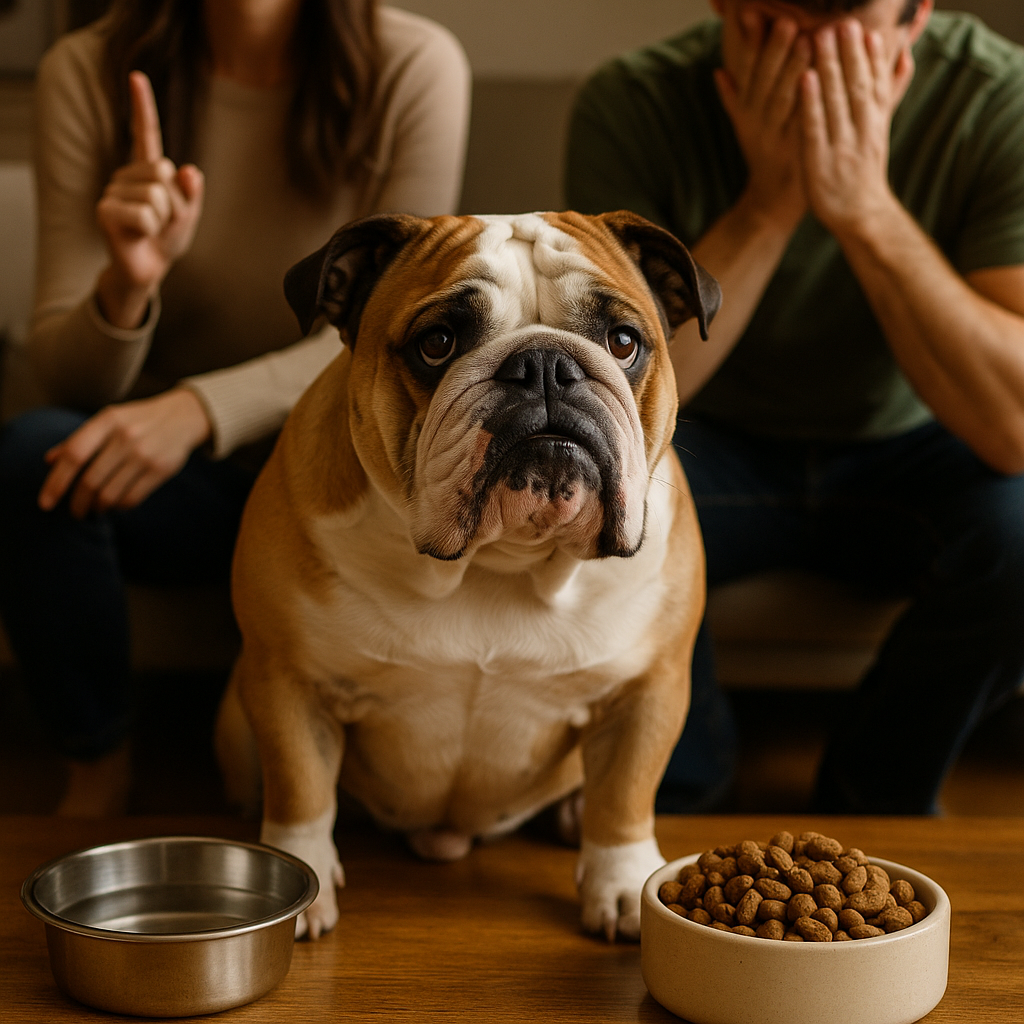Bulldogs are charming, calm, and loyal dogs, but they’re also one of the breeds that require the most attention in their daily care. Due to their unique physical traits, it’s easy to make mistakes without realizing it—especially if you’re a first-time owner. In this article, we’ll go over the most common mistakes Bulldog owners make and how to avoid them so your furry companion can live a healthier and happier life.
Ignoring Skin and Wrinkle Care
One of the most frequent mistakes is neglecting the cleaning of a Bulldog’s facial folds. These wrinkles, while part of their charm, can trap moisture, bacteria, food particles, and dirt. If not cleaned regularly, they can lead to very painful skin infections.
It’s important to clean your Bulldog’s facial folds with a damp gauze or pet-safe wipe at least three times a week. Always dry the folds thoroughly afterward, as trapped moisture encourages the growth of fungi and bacteria. Don’t forget to check the area under the tail, especially for Bulldogs with tightly curled tails, as this area can also collect dirt.
Not Considering the Ambient Temperature
Another common mistake is forgetting that Bulldogs are highly sensitive to heat. Because of their short muzzle (brachycephalic), they can’t regulate their body temperature well. This means that a hot day or a walk in the sun can quickly lead to heatstroke.
Avoid walking your Bulldog during the hottest parts of the day. Early mornings or late afternoons are ideal. Indoors, ensure good ventilation or air conditioning, and always provide fresh water. Never leave your Bulldog alone in a parked car, not even for a few minutes.
Overfeeding or Not Monitoring Weight
Bulldogs tend to gain weight easily, and many owners make the mistake of feeding them too much or offering excessive treats. Obesity in this breed can cause or worsen respiratory, joint, and heart problems.
To avoid this, always measure food portions based on your dog’s size and activity level. Use high-quality food and avoid feeding table scraps. Treats should be given in moderation—opt for low-fat snacks or dog-safe fruits like apples or carrots.
Not Providing Enough Physical Activity
Because Bulldogs are calm and sometimes lazy, many owners assume they don’t need exercise. While they aren’t an overly active breed, they do need regular short walks and light play to stay fit and avoid health and behavioral problems.
Lack of exercise contributes to weight gain, anxiety, and boredom. Two walks a day, each lasting 15 to 30 minutes, are usually enough—adjusted to your Bulldog’s pace. You can also keep them mentally engaged with puzzle toys or gentle indoor games.
Bathing Too Often or Using the Wrong Products
Some owners bathe their Bulldogs too frequently or use products that aren’t suited for sensitive skin. This can cause irritation, dryness, or even allergies. Baths should be given every 4 to 6 weeks, unless the dog gets particularly dirty.
Always use shampoo formulated for dogs with sensitive skin—free from strong fragrances or harsh chemicals. And remember to dry the dog thoroughly, especially in the skin folds and under the tail.
Skipping Regular Vet Visits
Some people only take their Bulldog to the vet when something seems wrong. This is a serious mistake. Bulldogs can develop respiratory, skin, and orthopedic issues silently, so regular checkups are crucial.
Schedule at least one vet visit per year, keep vaccinations up to date, carry out regular deworming, and monitor their weight. Also, check their teeth, ears, and eyes frequently to prevent infections.
Neglecting Dental Hygiene
Many owners forget that dental care is part of overall pet care. The buildup of tartar and plaque can lead to bad breath, pain, tooth loss, and serious health issues.
Brush your Bulldog’s teeth two to three times per week using a dog toothbrush and toothpaste. You can also supplement with dental treats or toys designed to clean teeth.
Not Socializing from a Young Age
Another common mistake is failing to expose Bulldogs to other people, animals, or environments early on. Socialization is key to raising a balanced, confident, and well-behaved dog.
Without proper socialization, Bulldogs can develop fears, anxiety, or even aggressive behaviors. Take your dog on walks, to parks, or arrange safe interactions with other pets and people. The more positive experiences they have, the more emotionally stable they will become.
Leaving Them Alone for Long Hours
Bulldogs are very attached to their families and do not handle prolonged loneliness well. Many owners work long hours without considering the emotional impact on their dog.
Spending too much time alone can lead to separation anxiety, with symptoms such as destructive behavior, excessive barking, or depression. If you work a lot, try to leave interactive toys, hire a dog walker, or ask a friend or family member for help.
Not Adapting the Home to Their Needs
Lastly, many mistakes stem from not properly preparing the home for a Bulldog. Slippery floors, unprotected stairs, or lack of a comfortable resting spot can cause injuries or discomfort.
Make sure your dog has a firm bed, place non-slip rugs where needed, and prevent constant stair use. Also, provide a quiet, safe space where they can relax without being disturbed.
Prevention Is Care
Avoiding these common mistakes will help you give your Bulldog a much more comfortable, safe, and happy life. With a bit of daily attention, observation, and lots of love, this breed can become the perfect life companion. Remember: every detail matters when it comes to your Bulldog’s well-being.
